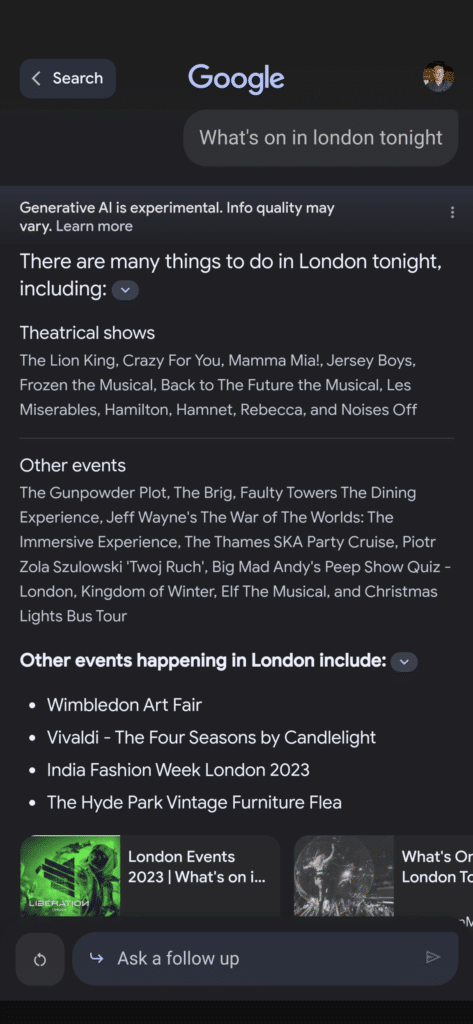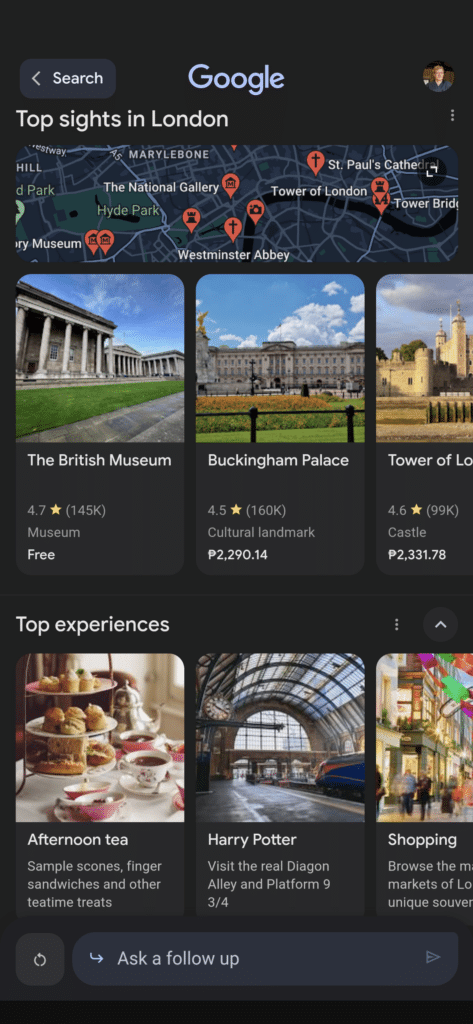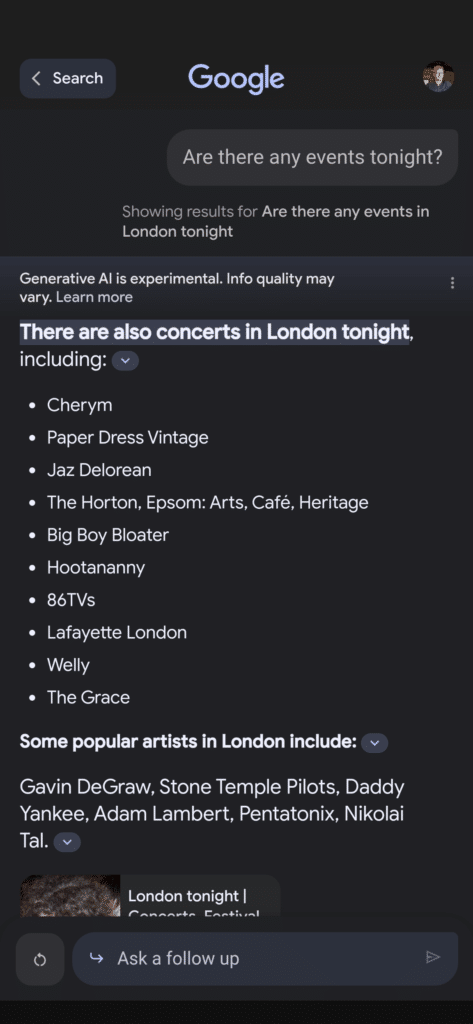Google increasingly focuses on making search results more relevant and user-friendly. AI is a key player in this transformation. In a move towards humanising the web, AI is pivotal in reshaping SERPs to be more user-centric and intuitive.
The way SERPs are evolving will have more of an impact on how we, as SEOs, do things moving forward with Search Generative Experience (SGE) on the horizon, we need to look at ways to adapt.
TL;DR summary of the key points from the article:
- Generative AI like ChatGPT is rapidly advancing and being integrated into search engines like Google and Bing. This will transform how people search and find information online.
- For SEO, the focus needs to shift from targeting keywords to understanding user intent and creating high-quality, helpful content that provides value for searchers.
- AI-generated content generally lacks the quality and originality search engines want, so avoid relying solely on it. Focus on using AI to enhance human-created content.
- Interactive SERPs with AI chatbots and content generated on the fly will reduce clicks to websites. Ranking factors like CTR will become less important.
- With more AI-created content flooding the web, having extensive, original, optimized content will help sites stand out in search. Adopt a “cluster content” strategy.
- Leverage AI for automating tedious SEO tasks. This frees up time for strategic initiatives like holistic search marketing.
- With conversational search, develop new metrics beyond rankings and CTR. Consider inclusion in AI snippets as a signal of content quality.
- SEOs should prepare now by focusing on understanding intent, creating high-quality content, using AI for automation, and shifting measurement.
The way we use search has changed.
Things changed so drastically in 2023 regarding AI that the search game has already changed. We are automating processes with AI that weren’t possible last year. So we can’t wait for it to change; it has already changed, and bigger changes are coming.
Google has been slow off the line, with Bard still a long way behind ChatGPT and Claude, but the technology is there, and Google is working on something bigger.
We are already at a point where AI can write better content, make better decisions and even complete complex tasks faster than most humans. These are the very early days. By the end of 2024, we will have AI Assistants who can effectively manage support channels without you knowing you are speaking with AI. You could have an AI assistant who can manage complex administrative tasks, make bookings and respond to emails.
Traditional search will be less relevant
The way we use technology has changed massively. Whether we will even go to Google to search is debatable, or the scope will be smaller for those using traditional search to find information. AI will start to introduce the information we are looking for in a better way. Google as a search engine will still dominate, but how we use it will change.
Voice assistants such as Google Assistant will become better and better as a search engine if Google can introduce the power of Bard into Google Assistant. The focus will move away from SERPs and into a generative AI experience based on the user’s intent and preferences.
This is a very early look at generative AI on a Google Pixel.



Note how Maps are integrated much better within the SERPs with generative AI. It feels native to browse and scroll through map results within the Google app. You can continue the search with follow-up questions, much like the Bard or GPT-style chat model.
As you can see above, the results aren’t perfect, but remember, this is still in development.
Using Google Assistant will change how we search, find and act with technology. Almost everything could be done within AI assistants (or SERPs if they will still be referred to as SERPs).
Understanding AI’s Role in Humanising the Web
Artificial Intelligence has been used for search for many years, but recent advancements have accelerated the focus on improving the user experience. Machine learning and natural language processing have transformed how search engines interpret and respond to user queries. BERT (Bidirectional Encoder Representations from Transformers) is a natural language processing technique developed by Google AI that enables computers to better understand the context and meaning of words in a sentence or paragraph.
In search queries, BERT is critical in helping search engines comprehend the user’s intent, even if the query is ambiguous or contains uncommon keywords. This is because BERT analyses the surrounding words and phrases to determine the overall meaning of the query.
It’s all about delivering what the user wants.
All this sounds complicated, but the end goal is to deliver the user’s wants in as few actions as possible. So if I want to know what is on in Chelsea this weekend and Google can tell me without going to a website to find out, then great.
In some areas of search, this has been horrible up to now. Take recipes, for example. I can’t count the number of times I need a quick recipe while cooking, and to find the recipe, I have to scroll past a 2000-word essay on the history of flour (an exaggeration, I know).
I hope SGE fixes this by putting the information the user wants before them. Yes, some sites that operate purely on content creation and ads will suffer.
Now for some geeky stuff.
Machine learning and natural language processing advancements
Machine learning is a smart tool. It learns and gets better with time. Its job? To make sense of human words on the internet. For example, it can tell if someone wants to buy shoes or just read about them when they search for ‘running shoes’.
Natural language processing works like our brains do with language. It helps machines understand how we talk and what we mean. Now, computers can use this to get the point of web chats, articles and even jokes! This all means that searching on Google has become much smarter over time.
BERT and its ability to comprehend context in search queries
BERT is a clever tool from Google. It makes the web smarter by getting what you mean when you search. This tech looks at your words and those around them to find out what you are asking for.

In this way, it knows more than just single-word meanings. BERT keeps learning all the time so that Google can make your search results better and better. Because of BERT, SEO now cares about helping users get what they want, not just stuffing websites with keywords.
Google Gemini AI
Google Gemini is an upcoming language model expected to be much more powerful than its predecessor, PaLM. Gemini is multimodal so that it can understand not only the connections between text on the internet but also images and video. Gemini also has reasoning abilities that may eclipse ChatGPT in terms of usefulness.
Google Search Generative Experience (SGE) is a new feature currently in beta testing.
Gemini and SGE are expected to work together in a number of ways. For example, Gemini could be used to help SGE understand the context of a search query and generate more relevant results. Additionally, Gemini could improve the accuracy of SGE’s predictions.
Here are some specific examples of how Gemini and SGE might work together:
- Gemini could be used to help SGE understand the intent of a search query. For instance, if a user searches for “best restaurants in New York City,” Gemini could help SGE determine whether the user is looking for a list of restaurants, reviews of restaurants, or a map of restaurants.
- Gemini could be used to help SGE generate more comprehensive search results. For example, if a user searches for “how to make a cake,” Gemini could help SGE create a list of ingredients, a step-by-step guide, and a video tutorial.
- Gemini could be used to help SGE improve the accuracy of its predictions. For example, if a user searches for “weather forecast for tomorrow,” Gemini could help SGE generate a more accurate forecast by considering current weather conditions and historical weather data.
Overall, Gemini and SGE are expected to work together to provide users with a more personalised and informative search experience.
What does all this mean?
It means AI will get better and better at giving you what you are looking for. Perhaps even before you begin looking. These tools will likely begin to appear within other apps that we use, and make suggestions via the form of an AI assistant.
Introduction to SGE (Search Generative Experience)
SGE refers to Google’s experimental feature named Search Generative Experience. Google Search Generative Experience (SGE) is a new approach to search that aims to provide users with more comprehensive and informative answers to their queries. This is done by generating text summaries of relevant content from multiple sources. SGE is still in development but is expected to impact SEO significantly.
SGE is still not ready for public release, but you can take it for a spin if it is available within Google Labs. If you haven’t been given access to Labs, you can see what it is all about below:
Here are some ways that SGE is likely to affect SEO
- Increased focus on quality and relevance: SGE will emphasise the quality and relevance of content. This means that websites must create well-written, informative, and relevant content to the user’s search query.
- Decreased click-through rates: SGE may lead to decreased click-through rates, as users can find the information they need without clicking on a search result. This could have a significant impact on organic traffic.
- Increased importance of domain authority: Websites with high domain authority are likelier to have their content included in SGE summaries. This means building and maintaining domain authority will be more important than ever.
- New opportunities for content creation: SGE may open up new opportunities for content creation. For example, websites could create content designed to be included in SGE summaries.
Overall, SGE is a significant change to how Google presents search results. This change will likely majorly impact SEO, and websites must adapt their strategies accordingly.
How does SGE work?
Let’s say you are looking for the ‘Best car seat for a 1 year old’, With SGE this is what you get:

To compare, this is what a current search result looks like (in November 2023):

So SGE or generative AI search is summarising information for the end user. Eliminating the need to dig around articles to find the best car seat for your 1-year-old.
Is the end user going to take these results at face value? It is hard to say, but as a parent, I know I’ll be doing more research. That said, the results SGE gives us are almost exactly what we see from reputable sources.
SGE also provides useful information related to the search:

I did another test on a search for the ‘Best CRMs for small businesses’:

This time, we immediately see the reference for the information and a link to the article. Is this going to take away traffic from Forbes? Maybe.
Having recently done this exact search, I would have researched the top results provided by the SGE without checking out the Forbes site.
Right below, we get a more comprehensive list of CRMs. Although missing big names like Close, this is a much better UX/UI than the regular SERPs.

If you are a SaaS company with SGE, you might see a higher CTR than regular search results. I know Nutshell CRM was not on the first page results, but now it is above the rest of the SERPs.
Who does this affect?
This will hit you hardest if you are a content website with information about which car seats to buy. There is still a place for links to sites, though, but not as prominent as before.

If we do a less commercial search, the results are more of a combination of sources from the top results on regular results. Again, the sources are linked right there to click on, but I still see the CTR dropping.

Personalised Search Results
SGE goes beyond simply matching keywords to websites; it analyses user intent, search history, and location to deliver personalised search results tailored to each individual. This means that users are no longer presented with a generic list of links but with a curated selection of relevant information for their needs and interests.
Interactive SERPs
SGE redefines the traditional SERP by incorporating interactive elements that enhance user engagement and provide a more dynamic search experience. These interactive elements can include carousels, knowledge panels, and even AI-powered chatbots that can answer questions directly within the search results page.
This could be super powerful as it will be a chatbot with full access to all search results.

AI-powered Content Generation
SGE leverages AI algorithms to generate snippets of text, summaries, and entire articles in response to user queries. This capability allows Google to provide direct answers to questions, eliminating the need for users to click through to external websites.
That is right, Google will be presenting their AI content right in search results. This will be a powerful feature, but if a lot of the content in SERPs is AI-generated, where does the buck stop, and how do we know the legitimacy of any of the results if all content comes from an AI source?
Will SEO fundamentals change?
SGE will have significant implications for traditional SEO practices. Keyword research, once a cornerstone of SEO, is becoming less relevant as algorithms focus on understanding user intent and context.
So, if you rely on shady SEO practices, expect SGE to impact your traffic. If your focus has been on quality, authoritative content, and authority links, this might be a welcome change to SERPs.
Let’s look at the fundamentals of SEO and how we can adjust each.
I’ve been thinking and planning a lot for it with our clients in the home service space
I think it’s even more important than ever to do the following on your website to leave a moat between you and the completion.
Lewis Vandervalk – Agency Owner at bluecrocus.ca
- Share pricing, and details behind what’s involved in your pricing.
- Video. Use YouTube to buid a video bank, answering common client questions. Build those into blog posts, service pages. Set yourself apart in the market by providing way more info to future clients than anyone else. (See the They ask, You Answer book by Marcus sheridan for more on this topic)
- Stats in your content. Talk about things that make you unique. Number of clients served, etc etc
Keyword Research
While keywords will still play a role in the age of generative AI SEO, the focus has shifted from identifying high-volume keywords to understanding user intent and search behaviour nuances.
SEO professionals must investigate the “why” behind user searches, identifying the underlying questions and motivations that drive search queries.
Content Optimisation
More than ever, content must be engaging, informative, and tailored to the target audience’s needs. We should be doing this anyway, so there is nothing new here. However, we must prioritise user experience and ensure that content is structured and presented in a way that aligns with natural human search patterns.
Link Building
Link building remains an important aspect of SEO, as it signals authority and relevance to search engines. The emphasis remains on building high-quality links from reputable sources that provide genuine value to users.
As always, link building should be a strategic process focused on establishing relationships with relevant websites and creating content worthy of backlinking. I don’t see link building being any different with SGE. It will still be a major factor in organic search.
Link building will get harder as AI begins to dominate. We will have entire sites built using AI. This will be a new wave of PBN-style sites.
Adapting SEO Strategies
What else should be considered in an SEO strategy with generative search being an impending factor?
Leveraging AI Tools
AI tools and advanced analytics can provide valuable insights into user behaviour, search patterns, and content performance. Embrace these tools to understand your target audience better and optimise strategies accordingly.
AI might change SEO, but it also gives us tools we could only dream of 5 years ago. If you aren’t already, you should be incorporating AI into your workflow.
Optimising for AI-powered Snippets and Summaries
SGE incorporates AI-powered content generation that directly answers user queries. Copywriters need to optimise their content for these snippets and summaries, ensuring they are concise, informative, and aligned with search intent.
Prioritising User Experience
User experience (UX) has always been an integral part of SEO, but think of it as more of a cornerstone now. With personalised search results and interactive SERPs, users expect a seamless and intuitive experience fulfilling their search intent. Designers & developers must ensure that their websites are optimised for UX, with fast loading times, mobile responsiveness, and clear navigation.
Embracing User Intent and Context
Understanding user intent is crucial in SGE SEO. SEO professionals must investigate the “why” behind user searches, identifying the underlying questions, motivations, and context that drive search queries.
This requires analysing search patterns, understanding user behaviour, and using AI tools to gain insights into user intent.
Creating Content that Addresses Human Needs
Consider how to generate content that caters to human requirements, interests, and emotions. For search experts, developing content that deals with particular user issues, provides value beyond just information, and creates an emotive link with the audience is crucial.
Write content for people, not machines. We have been saying this for years, but it is now more relevant than ever. The irony is that we are now actually writing content for machines to then give to people, but hey, if it increases revenue.
Potential Long-Term Impact of SGE on the Search Landscape and the SEO Industry
Google’s Search Generative Experience is poised to revolutionise how users interact with search engines. By providing direct answers to questions using machine learning, SGE has the potential to significantly reduce the need for users to click through to traditional search results pages (SERPs). This shift in user behaviour could profoundly impact the search landscape and the overall SEO industry.
Declining Reliance on Traditional Ranking Factors
The traditional ranking factors that have long dominated SEO strategies, such as keyword density and backlink profiles, may become less relevant as SGE gains prominence. Instead, content quality, relevance to user intent, and overall user experience will likely play a more significant role in determining search rankings.
Implications for SEO Professionals
SEOs must adapt their skills and strategies to stay ahead of the curve in the face of SGE. This includes:
- Embracing AI-powered SEO tools and techniques
- Developing a deeper understanding of user intent
- Focusing on creating high-quality, relevant content
- Continuously monitoring and adapting SEO strategies based on emerging trends
AI-powered SEO Tools and Automated Optimization Processes
AI-powered SEO tools are already beginning to emerge and will only become more sophisticated and widely used. These tools can help SEO professionals automate many time-consuming tasks in optimising websites for search engines. For example, AI-powered tools can help with
- Keyword research and analysis
- Content creation and optimisation
- Technical SEO audits
- On-page SEO optimisation
- Backlink analysis and acquisition
Automated optimisation processes are also becoming increasingly common. These processes can optimise websites for search engines without needing constant manual intervention. For example, automated processes can help to:
- Update website content with fresh, relevant information
- Optimise website code for search engines
- Automatically optimise image tags
- Manage and optimise backlink profiles
- Monitor and analyse SEO performance data
Continuous Need for Adaptation and Evolution
We haven’t seen changes this big in tech for a few years, and we may have become complacent. We need to constantly keep up to date with what is happening and be ready to adapt to the changing landscape.
Thoughts on the future of search engine marketing
I think we may get to a point where everything will be the same, but a few will stand out. If search is giving you results that are optimised with AI, and site owners are also creating the site content with AI, then where does that leave us?
Surely, everything will be the same, I’m not sure, but there will always be the ones that take the extra steps to check, research, and manually write or edit their content. AI will only get us so far. There is no replacing human creativity, empathy and desire.
Conclusion:
Are we living in shaky times to be in search engine optimisation? Yes, but SEO has always been an industry with lots of ups and downs.
If you are already focusing on authoritative content and links (and you should be), then nothing will change. Keep focusing on creating content for users first and links from genuine, relevant sites, and you will future-proof your search engine marketing strategy.
Yes, we will see a drop in through rates, and we may need to adjust the way
Here is a little summary of what you should focus on to ensure your site isn’t left behind:
- Create high-quality, informative, and relevant content.
- Build and maintain domain authority.
- Keep building authority links.
- Experiment with new content formats designed to be included in SGE summaries.
- Stay up-to-date on the latest SGE developments.
- Stay up to date on AI in general.
- Utilise AI tools to your advantage.
Worried about your SEO campaign? Speak to us, and let’s see if you need to adjust your strategy.






